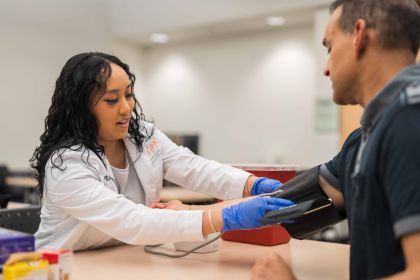Breadcrumb
Newly launched emergency management program prepares students to lead during a crisis

Erika Ramirez ’25, ’26
From wildfires and floods to global health crises—a new master’s program at University of the Pacific is preparing students to lead in emergency situations with a unique emphasis on medical readiness.
The Master of Emergency Management Science program launched with its first cohort of students this fall. Offered fully online, the program is designed for working professionals pursuing impactful careers in emergency and disaster management.
"The program at Pacific stands out by prioritizing health care as a cornerstone of emergency preparedness,” said Program Director Darcy Leutzinger. “In an emergency, medical readiness isn't just important—it's essential for saving lives and ensuring effective responses.
"By integrating health care into our emergency management curriculum, we are creating leaders who understand the complexities of safeguarding both the public and first responders,” he said. “This holistic approach ensures communities are better prepared for any crisis.”
Leutzinger is uniquely qualified to run the program. A nationally recognized leader in emergency management, he has more than 35 years of experience in active violence response and corporate security strategy as a former executive lieutenant from the City of Warren police department, SWAT commander and undercover narcotics officer.
He also develops nationally recognized Active Shooter training programs. HIs current program REACTasap is taught across the country.
The curriculum emphasizes the principles of emergency management while providing hands-on training in leadership. Students learn how to communicate during emergencies, navigate different scenarios and coordinate with multiple agencies. They also gain experience creating and reviewing emergency management plans, preparing them for roles in both government and private companies, such as emergency management coordinator, homeland security analyst or disaster response director.
The program’s flexible structure empowers students to earn their degrees while balancing work, family and other responsibilities. Classes run in an asynchronous format, allowing students to complete their degree in as few as 15 months.
“I was initially looking into behavioral psychology or public health, but the schedules weren't working with mine,” said Erika Ramirez ’25, ’26, who is among the first cohort of students in the program.
“I like that it is asynchronous. People have busy lives, kids, other things. The schedule is more flexible, and you know what's expected before the deadline,” she said.
Ramirez also sees the degree is an important step toward her future career goals.
“I think it's good to have even if you're not going to work directly in emergency services specifically, because you learn so much. I want to be a doctor, so I need to learn how to do things like work under stress and pressure and make decisions while having my composure. I feel like this program will help a lot,” she said.





